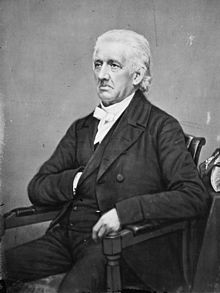Lyman Beecher
His mother died shortly after his birth, and he was committed to the care of his uncle Lot Benton, by whom he was adopted as a son, and with whom his early life was spent blacksmithing and farming.
In September 1798, he was licensed to preach by the New Haven West Association, and entered upon his clerical duties by supplying the pulpit in the Presbyterian church at East Hampton, Long Island, and was ordained in 1799.
[4] Following Aaron Burr and Alexander Hamilton's 1804 duel, Beecher gained popular recognition when he gave a sermon before the Presbytery of Long Island which was promptly published as The Remedy for Duelling in 1806.
They were sent throughout the United States, ran rapidly through many editions in England, and were translated into several languages in Europe, enjoying large sales even 50 years later.
[4] The rapid and extensive defection of the Congregational churches in Boston and vicinity, under the lead of William Ellery Channing and others in sympathy with him, had excited much anxiety throughout New England.
Beecher's Hanover Street Church was severely damaged by fire in 1830,[6] and the Board of Lane Seminary, hoping this might dispose him to a move, later that year offered him the presidency, with a salary of $20,000 (equivalent to $1,145,000 in 2023),[7][8] but he turned it down.
Nevertheless, the convent was burned, and just at the season when Lyman was alerting Massachusetts to danger from the "despotic character and hostile designs of popery".
For example, Ira Leonard, author of American Nativism, 1830-1860, notes that the three anti-catholic speeches "by Lyman Beecher" ultimately "ignited the spark["].
"[11]Beecher's term at Lane came at a time when slavery became an even larger issue, threatening to divide the Presbyterian Church, the state of Ohio, and the nation.
Its president, Arthur Tappan, through whose generous donations Beecher had been induced to head the new Lane Seminary, forwarded to the students a copy of the address issued by the convention, and the whole subject was soon under discussion.
It was seen as a hoax because firstly it was logistically impossible to relocate more than a handful of freed slaves, and secondly according to Gerrit Smith, the colonization movement aimed to make slavery more defensible, not end it.
Slaveholders from Kentucky came in and incited mob violence, and for several weeks Beecher lived in a turmoil, not knowing whether rioters might destroy the seminary and the houses of the professors.
The Board of Trustees interfered during the absence of Beecher, and allayed the excitement of the mob by forbidding all further discussion of slavery in the seminary, even at meals, whereupon the students withdrew en masse.
[14]: 9 Although earlier in his career he had opposed them, Beecher stoked controversy by advocating "new measures" of evangelism (including revivals and camp meetings) that ran counter to traditional Calvinist understanding.
The trial resulted in acquittal,[15] and, on an appeal to the general synod, he was again acquitted, but the controversy engendered by the action went on until the Presbyterian church was divided in two.
After the slavery controversy, Beecher and his co-professor Calvin Ellis Stowe remained and tried to revive the prosperity of the seminary, but at last abandoned it.
Beecher was proverbially absent-minded, and after having been wrought up by the excitement of preaching was accustomed to relax his mind by playing "Auld Lang Syne" on the violin, or dancing the "double shuffle" in his parlor.
It is open to the public and operates as an historical and cultural site, focusing on Harriet Beecher Stowe, the Lane Seminary, and the Underground Railroad.
The following year, he married Harriet Porter and fathered four more children: Frederick C., Isabella Holmes, Thomas Kinnicut, and James Chaplin.



